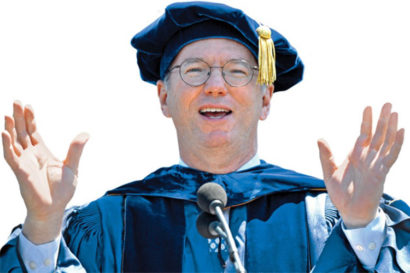By Eric Schmidt
Graduation season is an exciting time of happy endings and new beginnings. As our brightest young people put the finishing touches on their college careers, their attention turns to building careers where they will apply what they’ve learned to society’s greatest challenges and opportunities.
Throughout my own career, I have seen first-hand how this renewable human energy fuels our booming technology sector, an indispensable driver of the California economy. We would be lost without the young computer scientists, engineers and, yes, business and liberal arts majors coming out of places like UC Berkeley, ready to make the world a better place.
In 1982, I was one of those people. I graduated from UC Berkeley with a degree in computer science. I owe so much to the university for giving me the tools I needed to shape a successful career in technology.
While our socioeconomic well-being depends on a vibrant private sector, make no mistake, the strength of that sector is supported in profound ways by all that public higher education has to offer. And I feel that California owes it to ourselves to make sure that its institutions of higher learning remain places of immense promise and unlimited potential for students who will shape our state, and our economy, well into the future.
Today, the UC system educates about 90,000 more students than it did in the year 2000 with the same level of state funding. On a per-student basis, state support for the UC has plummeted from $19,100 per student to $7,500 in the 2016-17 academic year, even as the university has been compelled to admit a growing number of students. You don’t need to be a business executive to realize that is unsustainable.
California’s higher education system has long been one of the strongest and most accessible in the U.S. The UC is also known as a world-class incubator of discovery and innovation, generating more patents than any other university in the nation. It’s in UC’s DNA, from the very beginning.
It was 150 years ago that Californians first realized how a vibrant public university could help create a state like no other. Public officials invested back then, and it has been paying off for all of us. We have a talented and creative workforce. We have informed and engaged citizens. We live in a state that is now the sixth largest economy in the world. And much of that is due to our colleges and universities.
The investment of public funds in public universities has paid Californians back many times over. In fact, study after study shows that when it comes to public spending there is no better investment than higher education, with every dollar spent generating as much as seven dollars for the state’s coffers.
There’s a moral bottom line, as well. Budgets are moral documents – they reveal our true values. Putting more resources into higher education, sustaining what the state’s founders started, is not only an economic no-brainer – it’s the right thing to do.
New challenges, new dangers, and new opportunities face California now. We’re a different place than we were in 1982.
But we’re also in many ways the same: still committed to making our state a booming success, resting on the creativity and inventiveness of each successive generation of Californians. Our public universities got us to this point. We need to help them take us even farther in the future.
Eric Schmidt is the former executive chairman of Google and a member of the UC Berkeley Board of Visitors. He graduated from Berkeley in 1982. This op-ed ran May 31 in the Sacramento Bee.
